
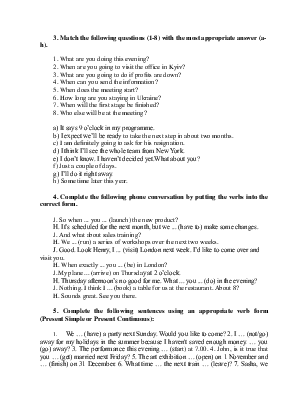
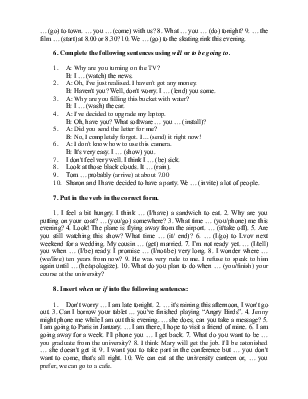
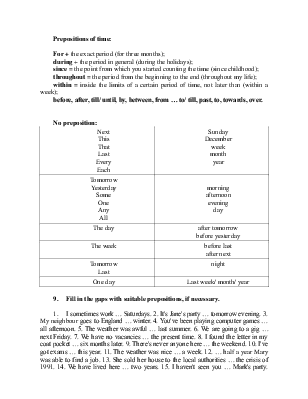
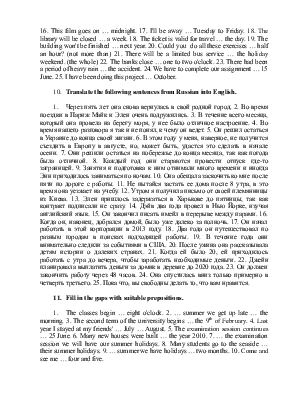
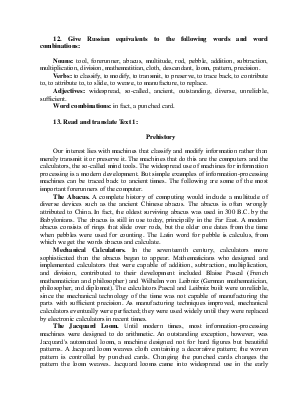
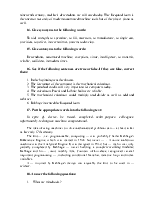
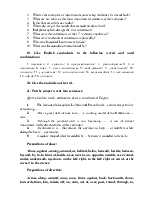
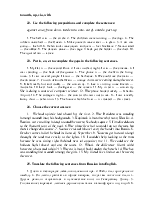
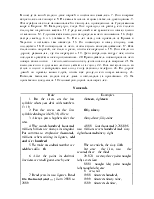
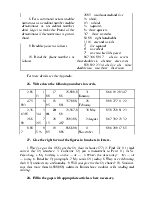
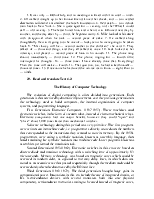
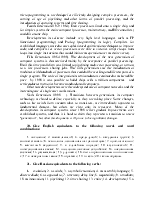
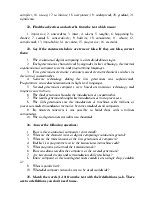
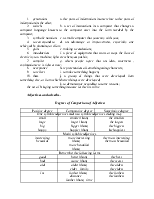
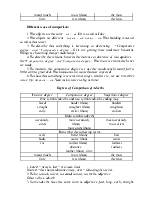
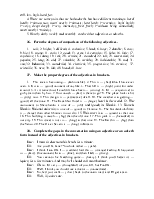
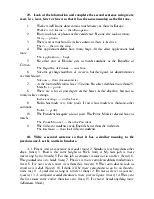
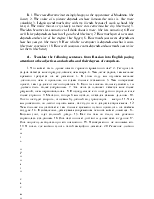
UNIT 4
Grammar: Ways of Expressing the Future; Prepositions of Time, Place and Direction; Numerals; Adjective; Adverb; Degrees of Comparison of Adjectives and Adverbs.
|
How to express the Future |
||||
|
Future Simple |
Future Continuous |
Present Simple |
Present Continuous |
to be going to |
|
Decision made at the moment of speaking, the future action as a fact |
The action that will be in progress at a definite moment of time in the future |
Future actions according to the timetable or curriculum |
Personal arrangement, planned action |
Decision made beforehand, action that is to happen according to some circumstances |
|
Where are you going? – To the party. – I’ll go with you I’ll be famous one day. |
This time tomorrow I’ll be making a report |
Next term starts on 11 February. |
I’m meeting my supervisor at 2 o’clock tomorrow. |
They are going to take part in that conference. Look at those clouds. It’s going to rain. |
Future Simple is not used after when, as soon as, while, before, after, by, till, until, if, unless in Time and Condition Clauses.
1. How could you offer to help in these situations?
1. “It’s really hot and stuffy in here”.
2. “I don’t understand this English and it needs translating”.
3. “This desk is too heavy. I can’t move it”.
4. “Damn! I’ve missed the last bus!”
5. “I don’t know how I’m going to find time to prepare any slides”.
2. Complete these sentences using appropriate verb forms (there may be more than one possible answer).
1. I ... (get) in touch when I ... (return) from the Middle East. 2. If they ... (shut down) the plant, a lot of people ... (lose) their jobs. 3. We ... (start) until everyone ... (be) here. 4. He can’t make a decision until he ... (see) the manager. 5. A project to create a bacterial cell from inanimate chemicals ... (go ahead) as soon as it ... (receive) approval from the committee.
3. Match the following questions (1-8) with the most appropriate answer (a-h).
1. What are you doing this evening?
2. When are you going to visit the office in Kyiv?
3. What are you going to do if profits are down?
4. When can you send the information?
5. When does the meeting start?
6. How long are you staying in Ukraine?
7. When will the first stage be finished?
8. Who else will be at the meeting?
a) It says 9 o’clock in my programme.
b) I expect we’ll be ready to take the next step in about two months.
c) I am definitely going to ask for his resignation.
d) I think I’ll see the whole team from New York.
e) I don’t know. I haven’t decided yet.What about you?
f) Just a couple of days.
g) I’ll do it right away.
h) Some time later this year.
4. Complete the following phone conversation by putting the verbs into the correct form.
J. So when ... you ... (launch) the new product?
H. It’s scheduled for the next month, but we ... (have to) make some changes.
J. And what about sales training?
H. We ... (run) a series of workshops over the next two weeks.
J. Good. Look Henry, I ... (visit) London next week. I’d like to come over and visit you.
H. When exactly ... you ... (be) in London?
J.My plane ... (arrive) on Thursday at 2 o’clock.
H. Thursday afternoon’s no good for me. What ... you ... (do) in the evening?
J. Nothing. I think I ... (book) a table for us at the restaurant. About 8?
H. Sounds great. See you there.
5. Complete the following sentences using an appropriate verb form (Present Simple or Present Continuous):
1. We … (have) a party next Sunday. Would you like to come? 2. I … (not/go) away for my holidays in the summer because I haven't saved enough money. … you (go) away? 3. The performance this evening … (start) at 7.00. 4. John, is it true that you … (get) married next Friday? 5. The art exhibition … (open) on 1 November and … (finish) on 31 December. 6. What time … the next train … (leave)? 7. Sasha, we … (go) to town. … you … (come) with us? 8. What … you … (do) tonight? 9. … the film … (start) at 8.00 or 8.30? 10. We … (go) to the skating rink this evening.
6. Complete the following sentences using will or to be going to.
1. A: Why are you turning on the TV?
B: I … (watch) the news.
2. A: Oh, I've just realised. I haven't got any money.
B: Haven't you? Well, don't worry. I … (lend) you some.
3. A: Why are you filling this bucket with water?
B: I … (wash) the car.
4. A: I've decided to upgrade my laptop.
B: Oh, have you? What software … you … (install)?
5. A: Did you send the letter for me?
B: No, I completely forgot. I ... (send) it right now!
6. A: I don't know how to use this camera.
B: It's very easy. I … (show) you.
7. I don't feel very well. I think I … (be) sick.
8. Look at those black clouds. It … (rain).
9. Tom … probably (arrive) at about 7.00
10. Sharon and I have decided to have a party. We … (invite) a lot of people.
Уважаемый посетитель!
Чтобы распечатать файл, скачайте его (в формате Word).
Ссылка на скачивание - внизу страницы.